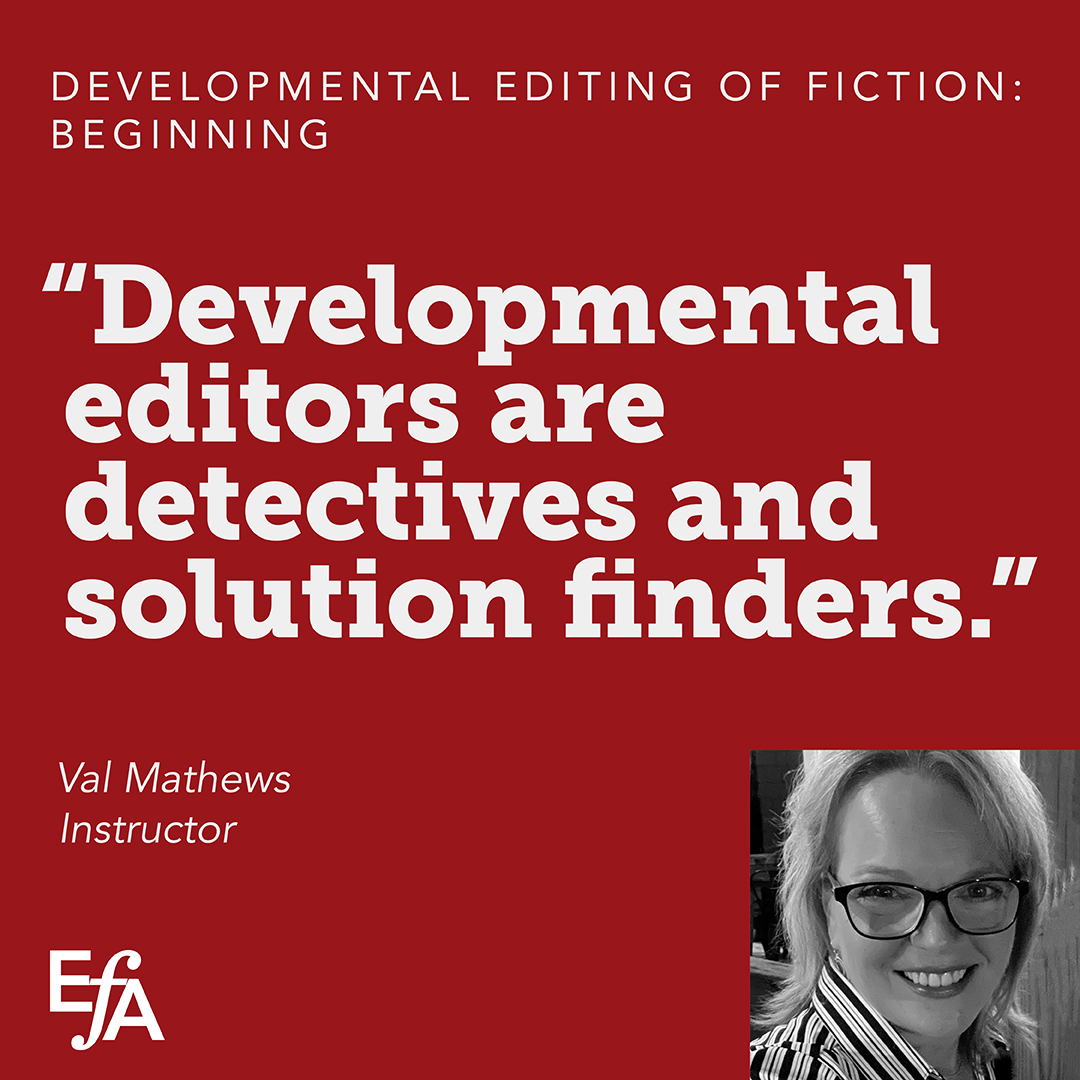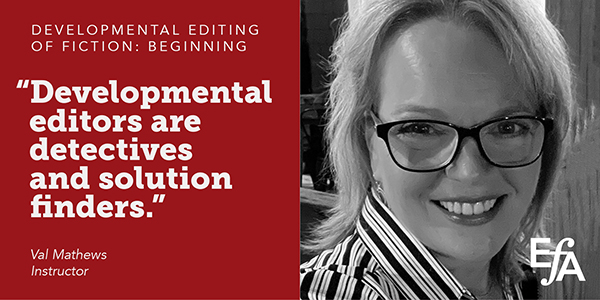Description
Self-paced courses are undertaken by the student at their own pace. No instructor feedback is given, although models are provided in the lessons. All self-paced courses include at least one live Q&A session, held via Zoom. Students will have 365 days to access the course material. To extend access by 3 to 12 months from the initial access end date, email the education coordinator. More information about how our classes are conducted is available here.
After placing your order, your course will be added to your personal course library on our education site. That site has different login information from the main EFA site. Please check your email for information on how to access the course.
Access to course materials begins immediately and lasts for 365 days.
Developmental editors (DEs) are all about the big picture. They assess how a manuscript hangs together as a whole, how a story moves and unfurls, how characters drive the story forward. If a manuscript lacks focus, DEs will help the writer find it. If an author lacks confidence, the best DEs inspire, challenge, and cheer on the author. And above all, DEs are the author’s collaborating partner—they hone the writer’s unique voice and make the author’s vision their vision.
This self-paced introductory course covers twelve learning modules and is presented through videos, readings, fun activities, and editing assignments. The lessons explain and illustrate concepts and offer opportunities to practice your learning. Answer keys will be provided for each activity and assignment.
This course is meant for anyone who wants to help authors shape their stories, develop their storytelling grit, and conquer the boring in their manuscripts. It covers the basic knowledge every DE needs to know to start working in the industry.
Module 1: Embarking on Your Fiction Editing Journey. You’ll discover what fiction developmental editing is and is not, and then you’ll explore your pet peeves in fiction and how you might address them. You’ll revisit your responses at the end of the course and witness how your perspective has evolved.
Module 2: Unraveling the Intricacies of Good Craftsmanship. You’ll uncover best practices, focusing on showing more than telling and weaving backstory rather than dumping. In the mini activities, you’ll edit a passage so that it “shows more than tells” and practice writing to an author about backstory dumps.
Module 3: Elevating Your Storytelling Craftsmanship. You’ll discover the options for point of view, the art of inner and outer dialogue, and how to infuse narratives with action beats that bring them to life. Interactive mini-activities will sharpen your skills in identifying point-of-view and dialogue issues.
Module 4: Revealing the Art of Plot, Threads, and Beats. You’ll dive into captivating plotlines, narrative movement, and the significance of structural beats. You’ll research beat sheets online and become familiar with the different types, and then you’ll sharpen your skills in identifying potential beats within an assigned short story.
Module 5: Unleashing a Client’s Narrative Power. You’ll explore structural integrity and scenes—the building blocks of compelling narratives. In your first major assignment, you’ll analyze an assigned short story, create an overview, and dig deep to find the story’s strengths.
Module 6: Nurturing Client Relationships and Crafting Diplomatic Feedback. You’ll learn about the developmental editor-author relationship and how to nurture it. In the assignment, you’ll identify, explain, and solve craft issues from the assigned story.
Module 7: Crafting Dynamic Characters and Navigating Ethical Issues. You’ll discover the nuances of crafting dynamic characters with flaws, arcs, and goals, while considering the ethical and legal aspects. In the assignment, you’ll continue evaluating the assigned short story and demonstrate expertise by writing diplomatic comments and queries.
Module 8: Cultivating Reader Empathy through Character Development. You’ll dig deeper into character development, focusing on character agency, motivation, and cultivating reader empathy. In the mini activity, you’ll create a developmental editing checklist to help you stay on task during a developmental edit.
Module 9: Discovering How Tension and Pace Impact the Narrative. You’ll analyze the assigned story’s pacing, tension, plot twists, and motivations driving the main character. In the mini activity, you’ll curate a list of impactful craft articles you can use as additional reading material for your clients to help them revise their manuscripts based on your suggestions.
Module 10—Crafting Impactful Developmental Editorial Letters. You’ll be guided through a developmental editorial letter, the backbone of a successful edit. You’ll also be introduced to in-text comments and an editorial color-coding system. For the assignment, you’ll read another assigned short story and begin to prepare for the final assignment.
Module 11: Managing Scope and Refining Your Developmental Editing. You’ll focus on preventing “scope creep” (when a developmental edit careens into a line or copy edit) and then bring everything together in the final assignment, where you’ll prepare a developmental editing package (editorial letter, in-text comments, and queries).
Module 12: From Novice to Entrepreneur—Embracing the Business Side of Your Craft. You’ll look at pricing, contracts, time management, and strategies for finding clients. Then you’ll revisit your pet peeves from Module 1 and examine how your approach may have evolved. Finally, you’ll be challenged to a year-long activity that will help solidify your learning.
This course is open to students at all levels.
Val M. Mathews teaches courses in editing for the University of California Berkeley Extension, Queen’s University in Ontario, Canada, and the Editorial Freelancers Association in New York City. She also works as an editorial consultant for CRAFT Literary and Masters Review, two well-established online literary magazines, and has worked as an editor for traditional publishers. Val earned an MA in Professional Writing from Kennesaw State University and a BFA from the University of Georgia. Fun fact about Val: She’s been an FAA-certified flight instructor for over 25 years, and in the past, she flew Lear jets for a living.



